Ginger is loaded with bioactive compounds that can provide relief and potential improvement for a variety of health conditions.
A flowering plant native to China, ginger is related to turmeric, galangal and cardamom, all of which are members of the Zingiberaceae family.
The section of stem that grows underground is called a rhizome, or in this case, the ginger root. Powdered ginger spice is made from the root, and whole roots can also be sliced, diced, juiced, or made into an oil.
Research
Rankings
1. Nature’s Bounty Ginger Root
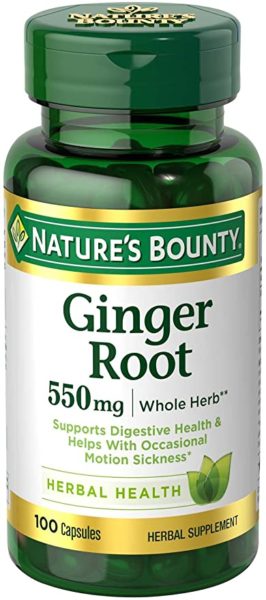
Nature’s Bounty provides 550 mg of dried ginger root in a vegan-friendly capsule. It’s everything you’d want from a capsule-based ginger root supplement: simple, potent, and pure. It’s great for a wide variety of applications, and if you aren’t looking to take ginger in liquid format, it’s our recommended top pick.
2. FGO Organic Ginger Tea Bags

Anyone in the market for ginger tea will absolutely love these delicious and healthy organic ginger tea bags.
The bags themselves are easily dissolvable since they’re made with eco-friendly materials. Combined with only organic ingredients, it’s one of the purest and most potent ginger supplements on the market.
3. Nature’s Nutrition Turmeric & Ginger
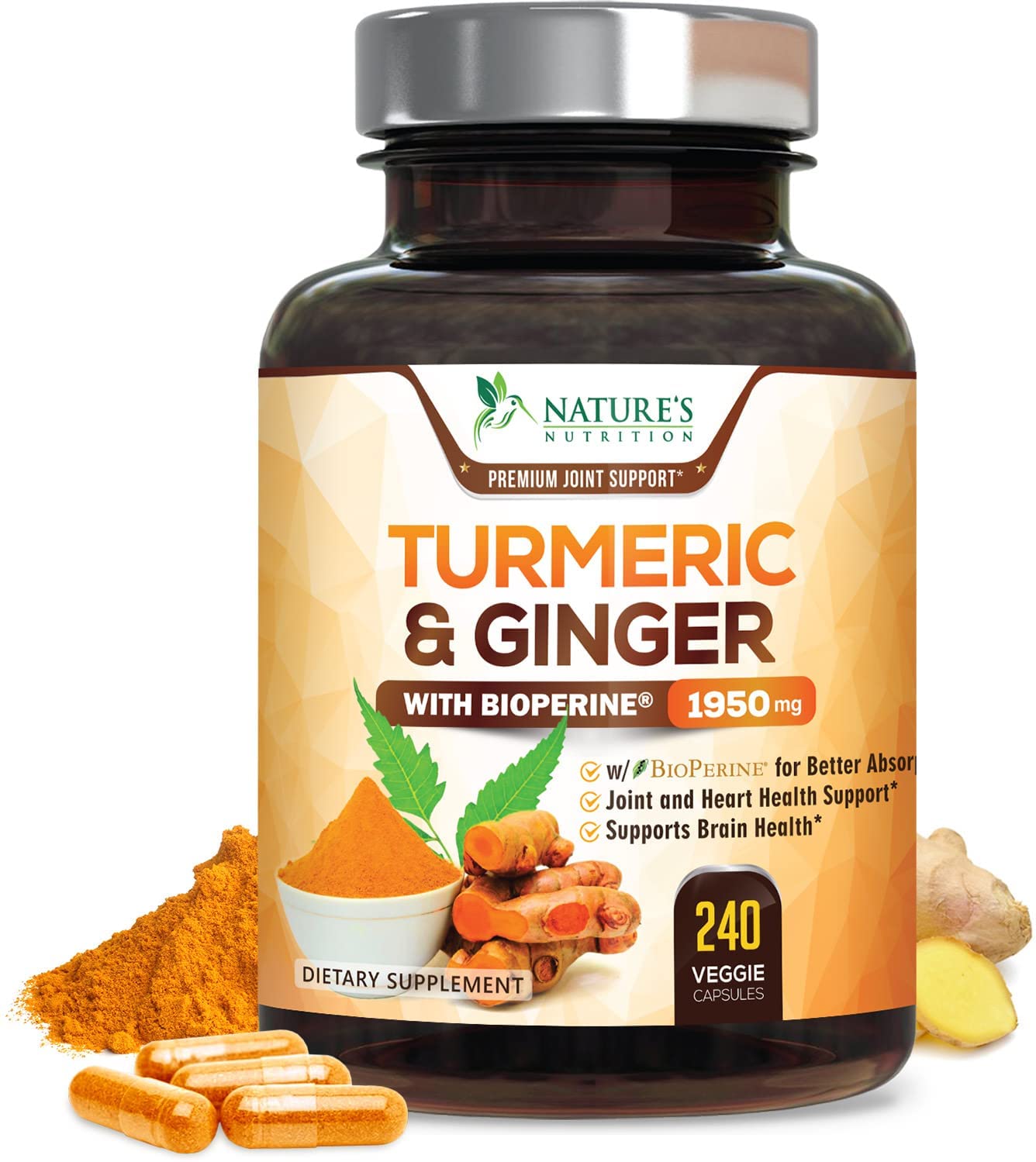
Turmeric and ginger are a powerful antioxidant and anti-inflammatory combination, and if you’re looking to take these together, Nature’s Nutrition is our choice. It’s got the highest dose of both turmeric and ginger among the combined supplements on the market, and on top of that, it includes BioPerine (black pepper extract), which has been proved to boost turmeric bioavailability.
4. Yogi Ginger Tea
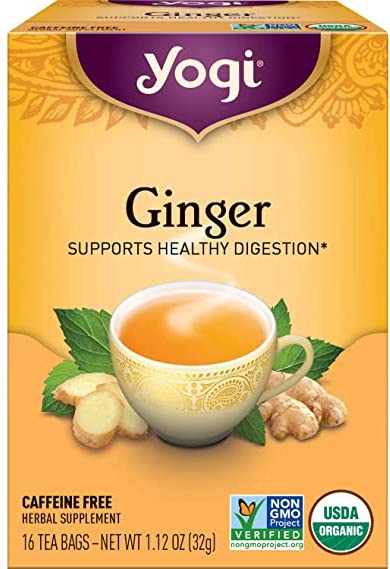
This alternative ginger tea comes in a pack of six for 96 tea bags in total. All the ingredients are all organic and non-GMO, so you get the highest quality ginger in every bag.
The teabags are combined with black pepper and peppermint for a wonderful flavor and additional health benefits.
5. BeLive Turmeric Ginger with Curcumin Gummies
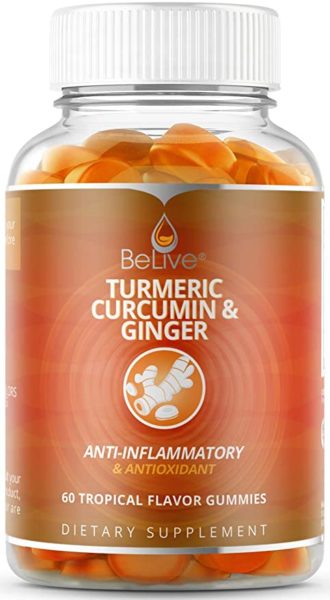
BeLive ginger gummies are combined with turmeric curcumin, both of which can help your stomach digest helpful substances more easily.
The gummies themselves are flavored with tropical fruit and are totally vegan friendly.
6. Bigelow Lemon Ginger with Probiotics

These lemon ginger tea bags come with 108 bags in total and are perfect to help your digestion. They also taste great.
The teas are individually wrapped so it’s easy to take some of them with you for on-the-go ginger tea.
7. The Ginger People Organic Ginger Juice

Ginger People’s organic ginger juice provides a great option if you don’t like capsules and ginger powder.
This convenient ginger drink is perfect for daily “health shots”, but you can also add it to smoothies or use it to flavor water or tea.
8. Nature’s Way Premium Herbal Ginger Root
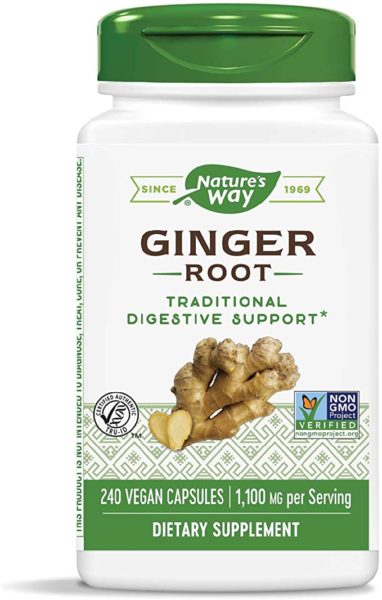
Nature’s Way herbal ginger root capsules are made from concentrated and non-GMO ingredients. The dosage is pretty solid, though there are a couple of extraneous binders and fillers.
8. Horbaach Super Concentrated Ginger Root
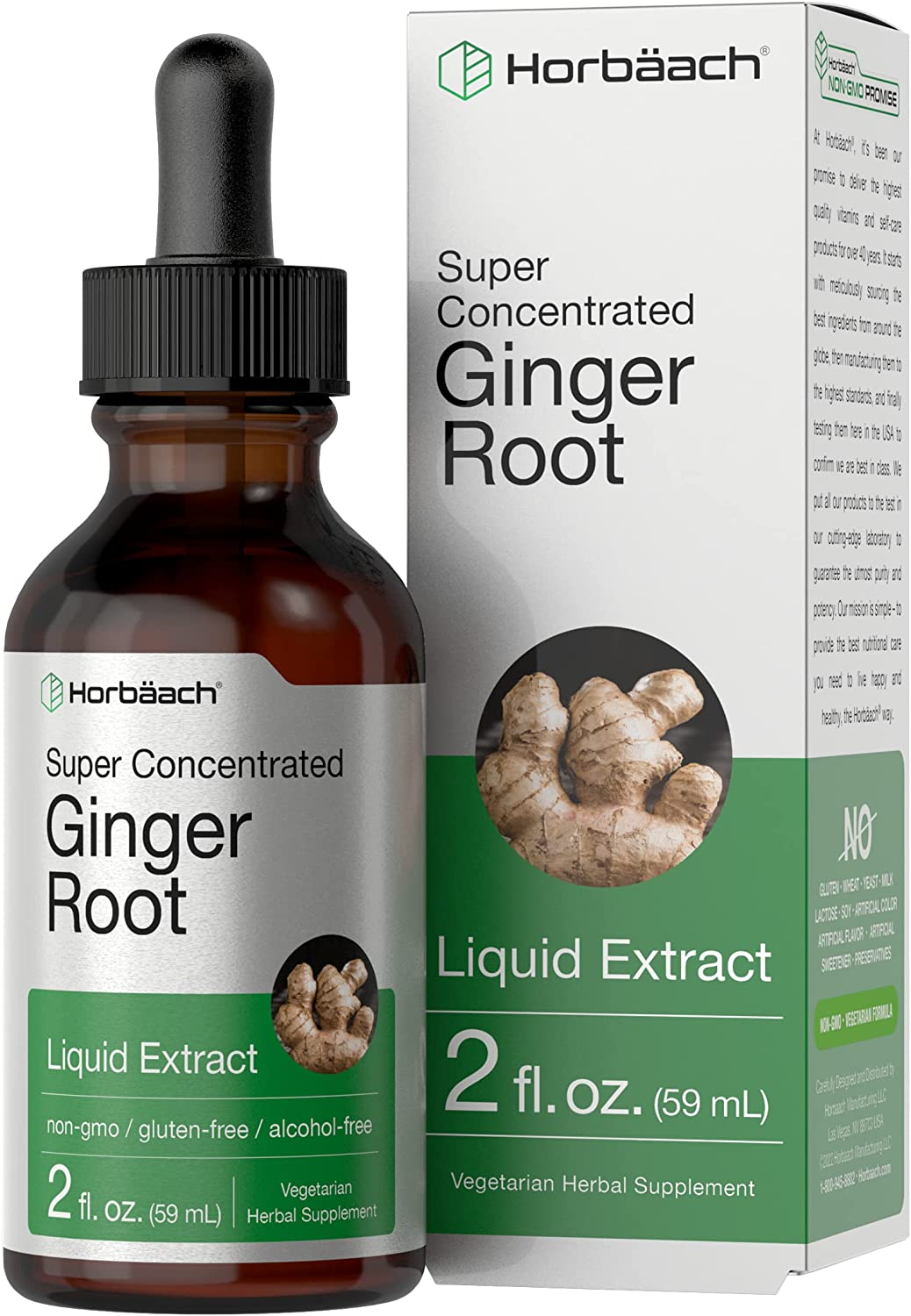
While most people looking for a liquid ginger supplement will do just fine with ginger tea, for the niche cases that need a ginger tincture, Horbaach is our recommendation. This liquid extract of ginger makes it easy to add ginger to custom shakes, smoothies, and green drinks.
8. Pink Stork Morning Sickness Sweets
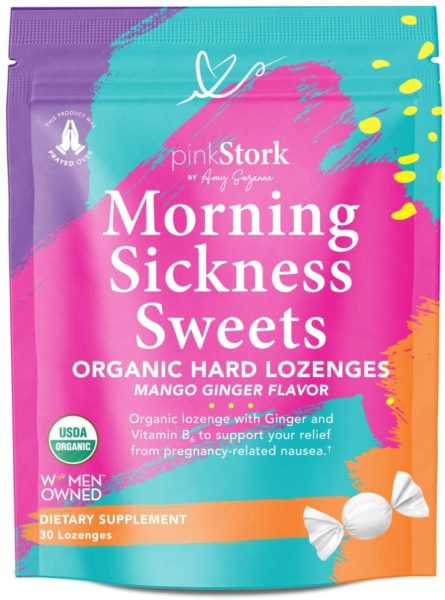
These last ginger supplements are actually candies; they’re specifically developed for women who suffer from morning sickness.
Flavored with mango for easier enjoyment, the capsules are also fortified with vitamin B6 for even more benefits.
Category winners
Best ginger overall: Nature’s Bounty Ginger Root
Nature’s Way makes the industry-leading ginger supplement: its dosage is powerful and its ingredients list is dead-simple. While capsule-based ginger isn’t the right choice for everyone, Nature’s Way is our preferred pick if you know that ginger tea is not for you.
Best ginger for tea: FGO Organic Ginger Tea
Ginger is one of the best supplements to take in liquid form, and there’s no easier way to do it than with FGO Organic Ginger Tea. This organically-certified tea has just one ingredient: dried ginger root. It’s prepackaged in individual satchels to make integrating ginger tea into your routine as easy as possible.
Best ginger for longevity: Nature’s Bounty Ginger Root
For leveraging the antioxidant effects of ginger to fight aging and boost longevity, Nature’s Way is our recommended product thanks to its solid dosage and ease of use. Since there are no extraneous ingredients, this ginger supplement integrates well into other anti-aging supplement stacks.
Best ginger for inflammation: Nature’s Nutrition Turmeric & Ginger
For fighting inflammation in your body, whether it’s localized to your joints or generalized throughout your body, we prefer to combine the effects of ginger and turmeric. Nature’s Nutrition is the best option here, thanks to its industry-leading dosages of both turmeric and ginger, plus BioPerine for better absorption.
Best ginger for nausea: FGO Organic Ginger Tea
For fighting nausea, an upset stomach, or morning sickness, ginger tea is definitely superior to ginger root capsules. That’s why we recommend FGO Organic Ginger Tea, our top-ranked ginger tea, for battling nausea. After steeping in hot water for a few minutes, this organically-certified ginger is sure to soothe your stomach.
Best ginger for libido: Nature’s Bounty Ginger Root
Ginger is a popular natural remedy for boosting libido and for having more energy in the bedroom, as evidenced by its common inclusion in male enhancement pills. If you’re looking to use ginger for a libido boost, you want something with a precisely-controlled and potent dosage, hence our recommendation for the 550 mg of ginger root delivered by Nature’s Way.
Who should buy ginger?
While ginger has been used for a variety of natural remedies for thousands of years, its two primary benefits are nausea relief and inflammation relief. Although ancillary benefits do exist, those benefits either aren’t as well studied or aren’t as potent.
Therefore, people suffering from either nausea or excess inflammation will benefit the most from ginger supplements, teas, and powders.
Pregnant women who experience morning sickness, can especially benefit as ginger supplements (or even eating food with ginger in it) can help relieve the effects of nausea significantly. Similarly, anyone who is nauseous because of a stomach bug or because of mild food poisoning might benefit from drinking a ginger tea or spicing their next meal with ginger.
Athletes, who suffer from irritated or inflamed muscles because of their exercise can also benefit from ginger products or teas. That’s because the anti-inflammatory effects of ginger are not localized – they spread throughout the body, and relatively quickly.
Anyone, but especially the elderly, suffering from general systemic inflammation can benefit from ginger tea. If you are taking any prescription medication, it is best to speak to your doctor before taking a ginger supplement.
How we ranked
Because Ginger has been a remedy for a variety of ailments for a long time, humans have come up with a plethora of ways to ingest the substance. Pills are the most common form, and are the easiest to accurately dose. Ginger juices like Nature’s Way, are quite popular since they’re an easy way to get some ginger into your system without too much effort. These can also be a great choice if you want to mix your ginger with a daily smoothie.
You can also find ginger in teas. These are usually made with ginger powder and can quite easily be combined with other flavoring elements like peppermint or black pepper. Ginger tea is the oldest and most common way to ingest ginger, so it’ll be a good choice if you already enjoy drinking tea every day. For these reasons, ginger tea’s like FGO ranked extremely well on our list. Ginger candies like the one from Pink Stork are also a great option, especially for pregnant women who may find it difficult to consume ginger in less palatable forms. .
We also wanted to focus on the ginger content or potency with every ginger supplement. Of course, capsules usually contained a much higher ginger concentration than teas or candies. However, many people already consumes ginger in high amounts through diet, making capsules somewhat overpowering.
This is why ginger capsules more often than not, result in mild side effects. As such, we preffered teas and powder over straight capsules. We did include some high quality capsules above for those people who consume minimal ginger through their diet.
Ginger is quite flavorful and not everyone’s favorite spice – so we looked for ginger that included other subtle ingredients to improve the flavor profile. For instance, several of the ginger teas described above, like Yogi, are combined with peppermint that make the ginger more palatable.
Benefits
Ginger can help reduce inflammation in the body. The medicinal qualities of ginger have been known for thousands of years. Ginger is effective at reducing nausea, digestive issues, and fighting the flu or the common cold. Its natural oils give it the distinctive smell and flavor, which arise mostly from gingerol, the main bioactive compound.
Research shows that Gingerol has powerful antioxidant properties, as well as the ability to tame inflammation (1).
Ginger may help sooth digestion. Ginger has long been used as a treatment for seasickness, helping to back off intense feelings of nausea (2).
Also effective in soothing nausea after surgery, ginger has been used by chemotherapy patients to reduce vomiting (3).
Ginger can soothe morning sickness. Where ginger really shines is in calming morning sickness during pregnancy. An analysis of 12 separate studies with more than 1,200 pregnant women indicated just over a gram of ginger powder can significantly reduce symptoms of nausea (4).
Pregnant women should discuss using ginger with their doctor before taking it; while no evidence exists to support the idea, some believe ginger taken in large quantities raises the risk of miscarriage.
Ginger can help reduce the pains caused by menstrual cramping. A study with 150 women taking a gram of ginger on each of the first three days of their periods indicated the herbal therapy reduced pain as effectively as ibuprofen and mefenamic acid (5).
Chronic indigestion, or dyspepsia, is another common digestive issue that may be helped by ginger. This painful condition is thought to result from delays in emptying the stomach after eating, and ginger has been shown to cut the time for this process by 25% to 50% (6, 7).
Ginger supplements can help fight off infections. Gingerol, which is the bioactive compound found in fresh ginger, has been shown to inhibit the growth of many types of bacteria (8).
It is especially effective in discouraging oral bacteria that contribute to gum diseases like periodontitis and gingivitis (9).
The RSV virus, which can lead to respiratory infections, is also susceptible to the anti-viral properties associated with fresh ginger (10).
Ginger can help reduce the risk of developing chronic disease. Researchers have begun to explore the potential of ginger in treating diabetes, with promising results. A study done in 2014 tracked blood sugar levels of 41 test subjects diagnosed with type 2 diabetes, concluding that a dosage of two grams of ginger powder daily dropped fasting blood sugar readings by an average of 12% (11).
Other significant changes noted in the study include a 10% reduction in HbA1c (a marker associated with long-term levels of blood sugar) over the 3-month period, as well as lower levels of lipoprotein oxidation, which could positively impact risk factors for heart disease.
Even though the study was small, the impressive statistics will likely inspire another look at the potential of ginger in preventing diabetes and heart disease. Other research explored the effectiveness of ginger in lowering cholesterol levels, another important marker associated with the development of heart disease.
When 85 patients with high cholesterol took 3 grams of powdered ginger daily for 6 weeks, most cholesterol markers showed significant improvement (12).
In animal studies, ginger’s performance rivaled that of the cholesterol-lowering drug atorvastatin. (13)
Both human and animal studies reflected lower total cholesterol levels, as well as lower blood triglyceride measurements.
Ginger may help prevent cancer. Studies using 6-gingerol, a substance abundant in raw ginger, have evaluated the strategy as a cancer preventive; the responses of 30 patients to a 2-gram daily dosage of ginger extract included a reduction in molecules involved in pro-inflammatory signaling in the colon (14).
However, data from a follow-up study failed to confirm those results with patients rated as high-risk for developing colon cancer (15).
Other areas of testing to determine the effects of ginger in cancer prevention are ongoing, including studies on breast cancer, ovarian cancer and pancreatic cancer (16, 17, 18).
Ginger may help soothe muscle pain. If you overworked yourself at the gym, ginger may help decrease the pain of sore muscles. When people engaging in elbow exercises took 2 grams of ginger daily over an 11-day period, muscle pain was significantly reduced (19).
It appears that ginger doesn’t necessarily lead to immediate relief, but rather slows down the progression of pain development over a period of time (20).
Researchers believe this is due to the anti-inflammatory properties of ginger. Fighting inflammation could prove useful in preventing a number of conditions, and has been successfully used to decrease the pain associated with osteoarthritis.
Ginger may help soothe joint pain. Joint pain and stiffness results from deterioration of joints in this increasingly common health problem, and many suffering from osteoarthritis require high doses of medication to control pain.
One group of 25 test subjects who had debilitating knee pain were able to decrease the amount of medication they took when supplementing with daily doses of ginger extract (21).
Another study indicated osteoarthritis patients experienced noticeable relief after applying a topical remedy containing mastic, ginger, sesame oil and cinnamon to painful areas (22).
Ginger may fight off age-related brain diseases. The anti-inflammatory properties of ginger may even help protect against chronic inflammation and oxidative stress that contributes to the aging process; this could positively influence cognitive decline related to aging, as well as decreasing the chances of developing Alzheimer’s disease.
Animal studies suggest the active components in ginger have the potential to reduce inflammation in the brain, and human clinical trials show supplementing with ginger helped middle-aged women improve memory and reaction time (23, 24).
Adding ginger as a spice to foods you already enjoy is a great way to start cashing in on the benefits of this superfood, and you may also find it effective in treating specific disorders when taken as a supplement in the form of extracts, oils or capsules.
Side Effects
Ginger may not be appropriate for nursing women. Ginger is great for pregnant women but may not be a good supplement if you’re breastfeeding. This is because breastfeeding transfers almost everything that the mother eats to the infant. Unfortunately, there isn’t enough information about the safety of ginger in an infant’s diet.
Ginger can increase your risk of bleeding. There is some evidence to suggest that ginger can increase your risk of bleeding from an open wound or if you have anemia to some extent. Therefore, talk to your doctor before taking ginger supplements or remedies if you worry about bleeding in general. This is especially important if you are going to undergo surgery of any kind.
Ginger can increase your insulin levels or lower your blood sugar. As a result, diabetics may need to adjust their medications via their healthcare providers to avoid potential negative side effects. Again, speak with your doctor before taking a ginger supplement if you have diabetes.
Ginger can negatively affect the heart. Some high doses (5g or more per day) of ginger can worsen various heart conditions.
Topical ginger supplements may irritate the skin. Most ginger supplements are taken orally. If you try to use ginger root on your skin, you may encounter additional side effects in the form of rashes or general skin irritation.
Ginger can cause an allergic reaction in some people. If you begin to experience an allergic reaction, stop using the ginger product immediately. Allergic reactions are characterized by swelling of the throat, mouth, or face, along with hives or general difficulty breathing.
Ginger can interfere with some medications, particularly those taken regularly. Contact your doctor if you’re taking several regular medications to avoid unnecessary side effects.
Recommended Dosage
The recommended dose of ginger depends on what you are using the ginger for and your supplement’s format. If you are using ginger for general nausea and vomiting, you should only take between 500 and 2500 mg of ginger daily. It’s best to split up your dosage into 2 to 4 divided applications until symptoms cease.
If you want to take ginger extract or a ginger supplement for menstrual cramps, 250 mg of ginger for three days at the start of the menstrual period should suffice. You can alternatively take up to 1500 mg of ginger powder daily in three divided doses. Start two days before menstruation and continue for the first three days of the cycle.
The Food and Drug Administration (FDA) says that consuming up to 4 g of ginger every day is generally safe. Anything more and you can risk side effects (25).
FAQ
Where is ginger sourced from? The original growing region of ginger is southeastern Asia. Specifically, it’s from the plant family Zingiberaceae. It was originally used as a spice for flavoring different foods and only later became known as a medicinal product. Today, it’s used for both and can be grown in other locations so long as they have a similar climate, such as Africa and Latin America.
What does the native ginger plant look like? Ginger plants grow to a height of between one and 1.5 m. They feature leaves that are usually long and dark glossy green in color. Ginger plants also produce flowers that are yellow-green in color, but may feature purple lips or interiors.
Is it important for ginger supplements to be organic? Organic ginger is not necessarily more potent than nonorganic ginger. But it doesn’t pose the same health risks associated with pesticides.
Organic just means that the ginger wasn’t grown with any artificial preservatives, pesticides, or other compounds throughout any point of the growing process. In many cases, ginger harvested in this way is pricier, but possibly healthier than ginger harvested with synthetic assistance.
What foods are normally combined with ginger? Ginger is one of the main essential spices around the world. It’s great for both savory and sweet dishes and is particularly popular with Asian cuisine. Soups and curries frequently make use of ginger, as do baked goods like biscuits and scones. Furthermore, you can add ginger into various marinades or dressings, or even sauces.
Why does ginger work as a remedy, especially for nausea? The specifics aren’t fully understood, but many experts believe that ginger provides medicinal benefits because of its primary bioactive component: Gingerol.
This compound can increase digestive responsiveness and has anti-inflammatory properties. Combined, this is thought to move the digestive process along and reduce inflammation at the same time. As such, ginger relieves nausea and causes any problematic food or compounds to pass out as stools or urine more easily.
Is ginger effective for children? Ginger is notably less effective with children than with adults, though the reasons aren’t very clear.
Why is ginger found in so many different forms? Ginger was first used as a spice and quickly mixed into tea; these are the two most common types of ginger supplements or remedies you can find. As medicine progressed, ginger powder was processed in other ways. Crystallized ginger or ginger added to candies came about when candy-making knowledge increased.
More recently, ginger essential oil has become another home remedy. Ginger capsules use concentrated ginger powder and extract surrounded by veggie capsules for easy digestion. Ultimately, ginger is found in so many varieties because it’s been around for a long time and is easy to combine with other ingredients.
Where does ginger’s flavor come from? The other main compounds in ginger are called shogaols. These provide the pungent taste that most people associated with ginger root. Furthermore, one of these shogaols is the primary source of antioxidants in ginger. For this reason, fresh ginger root is often thought to have better medicinal properties.
Does ginger provide additional nutritional benefits? Yes, ginger contains several vitamins and minerals and other key macronutrients. In total, a standard serving of ginger has just under 5 calories (4.8 to be exact), a little over 1 g of carbohydrates, 0.12 g of dietary fiber, 0.05 g of fat, 0.1 g of sugar, and 0.11 g of protein.
It also contains trace amounts of vitamins and minerals, including vitamins B3 and B6, potassium, iron, vitamin C, folate, phosphorus, zinc, riboflavin, and niacin.
All told, there’s a lot of great stuff in ginger, which is why it’s a key part of many healthy diets and is even one of the better spices you can add to your food while you are dieting. However, keep in mind that ginger doesn’t provide any macronutrients in enough of a quantity to serve as a replacement for any food items.
Is fresh ginger better than powdered ginger? Fresh ginger is generally considered to be better for cooking since you get more of its nutritional value before it dissolves. However, powdered ginger spice can still work as a substitute. Keep in mind that the taste and smell are significantly different.
When cooking with ginger, 1 teaspoon of fresh ginger is equivalent to about ¼ teaspoon of powdered ginger.
Related Articles
Recap
Bioactive substances in ginger can impart a wide range of health benefits, including lowering blood sugar, improving markers associated with heart health and other chronic diseases, staving off nausea, decreasing pain, and sharpening cognitive processes.
While it comes in a variety of forms, it’s best to always opt for organic ginger to minimize the ingestion of pesticides and other harmful chemicals.
For BodyNutrition’s #1 recommended ginger supplement, click Check the lowest price.